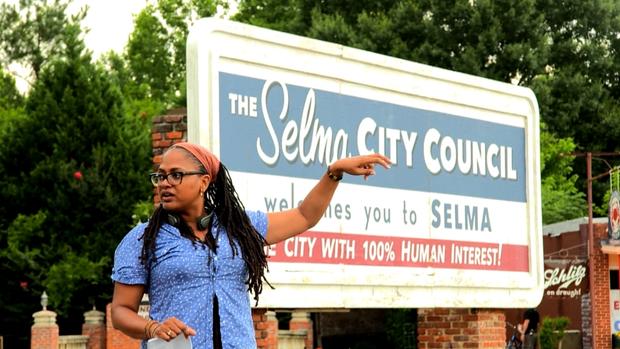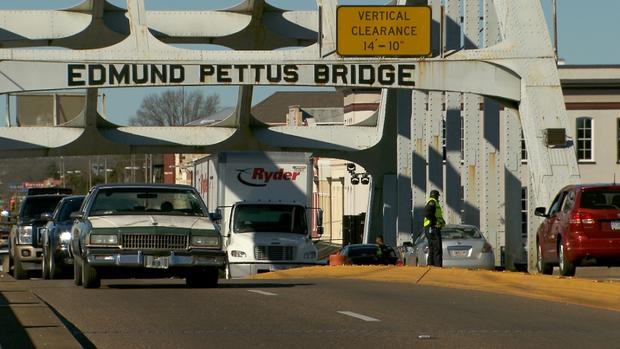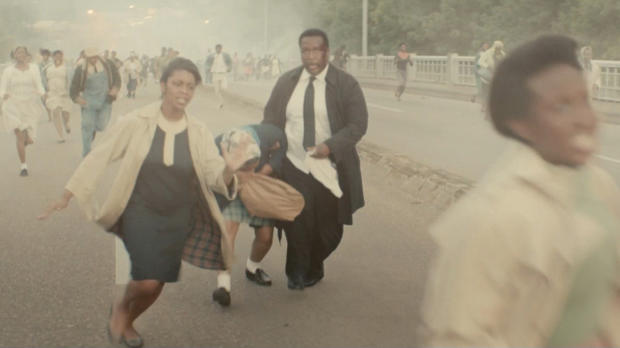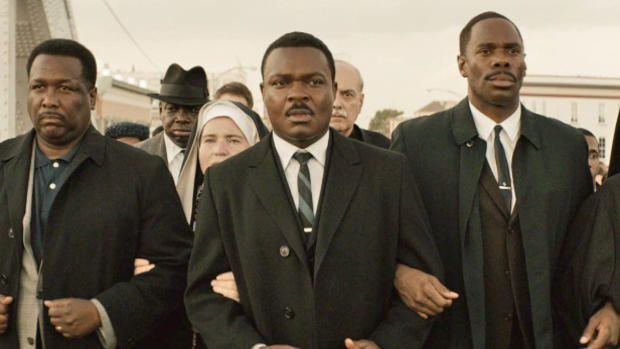Where "Selma" meets Hollywood
The following script is from "Selma" which aired on 60 Minutes Feb. 8, 2015. Bob Simon is the correspondent. David Browning, producer.
Selma, Alabama, and Hollywood, California, are many worlds apart: one is the dream factory of America, the other, a small Southern town where, 50 years ago, history was written in blood. Ava DuVernay has a foot in both worlds.
In Hollywood, the movie she's directed about Martin Luther King and the Civil Rights struggle in Selma has attracted both lavish praise and considerable controversy. And she has deep family ties to the backwoods around Selma, where the Ku Klux Klan once reigned, and where people have long memories of painful times past. Herewith, our tale of two cities.
Ava DuVernay: You know, the thing that I was really interested in doing with the film is making King more than a catch phrase, more than a holiday, more than a street name in a black neighborhood, more than a stamp, more than one speech. I mean, I wanted him to be a man, a living, breathing man.
[From the film "Selma": MLK: Those who have gone before us say - "No more! No more!" That means protest....]
In DuVernays' film, the British actor David Oyelowo does indeed make King come alive. It's a vivid retelling of those dangerous days in 1965 when in Selma, and much of the South, the right to vote was reserved for whites. And blacks were given impossibly difficult tests to get on the voting rolls.
[From the film "Selema": Registrar: How many county judges in Alabama?
Oprah's character: Sixty-seven.
Registrar: Name them.]
The flash point in Selma came when voting rights marchers crossed this bridge one Sunday, hoping to take their case all the way to the state capital of Montgomery, 50 miles away.
[File footage: Sheriff: You are ordered to disperse.]
This is the real life version of what happened at the foot of that bridge, described in 1965 by CBS News correspondent Bill Stout.
Bill Stout: They were beaten back with canes and clubs and whips and tear gas and nausea gas. The screams of the marchers and the thud of the clubs and hoof beats were carried by television to an unbelieving America...
[From the film "Selma": Sheriff: Troopers advance!]
And 50 years later, Ava DuVernay's recreation of that moment - has a shocking power as well.
Ava DuVernay: Hundreds of black citizens running, being beaten, being bludgeoned because they were in a quest for their own freedom and dignity.
Then - as now - the bridge bore the name of Edmund Pettus, a Confederate general and leader of the Alabama Ku Klux Klan.
Ava DuVernay: The bridge still honors the Grand Dragon of the KKK.
Bob Simon: Well, what do you think of that?
Ava DuVernay: I took great pleasure directing scenes on this bridge. I imagined him turning over in his grave a little bit. Thinking, "Where did it all go wrong? This was not supposed to happen."
[Ava DuVernay: And - rising ...]
And by Hollywood odds, Ava DuVernay's rise to prominence shouldn't have happened either. Women directors are rare enough, making only four percent of the films according to one study. And a woman director of color is virtually unheard of.
[Ava DuVernay: Cut.]
Bob Simon: Do you think that your film "Selma" is such an important event that this in and of itself is going to be a big step in the direction of enabling future people to do it?
Ava DuVernay: I don't know. I don't know. I'm not a big believer in one, you know, one person that's a door opener. Because I can open a door but if there's no one coming through it or if the door is allowed to close right after me, it doesn't mean much.
[Ava DuVernay: Action.]
She may be a relative newbie as a director, but she's an old hand at the business of selling films. She worked just out of camera range for years as a publicist on movies such as "Dreamgirls" and "The Help": planning premieres, arranging photo ops, getting the word out.
On the set of the movie "Collateral" several years ago, she watched director Michael Mann in action and decided to try directing herself. She made some low budget films that were well-received - which eventually led to her first film for a major studio: "Selma."
Bob Simon: You'd never done anything like that before. All the people, all the sets, everything -
Ava DuVernay: I had, as a publicist. Have you ever done a red carpet? Shut down Hollywood Boulevard, Mann's Chinese Theater?
Bob Simon: I have never -
Ava DuVernay: It's the -
Bob Simon: - been invited.
Ava DuVernay: It's the pl - next time we'll invite you. It's people. It's coordination. It's organization. It's mass scale in terms of everything falling into line.
[Ava DuVernay on set: So my cameramen are going to be walking, moving, along the crowd.]
In short, it's what movie directors do.
Bob Simon: You exude confidence. But are you saying that you weren't the slightest bit intimidated?
Ava DuVernay: You know, I was not. I felt in pocket, you know?
Bob Simon: What does that mean, "in pocket?"
Ava DuVernay: I felt that I was in the place that I should be. I had made five films before that time. My not making a film of this size was not by choice. It was not because I couldn't do it. It's because no one was handing me $20 million to make a picture.
[Ava DuVernay in woods: I found myself really wanting to come back here...]
A Californian by birth, DuVernay visited Alabama every summer as a kid. Her father's family has worked the land for decades in hard scrabble Lowndes County, not far from Selma, where the Klan once had free reign.
Ava DuVernay: There was no one protecting anyone out here. You're in the open fields. You're housing and feeding civil rights workers that come in. Someone comes and burns a cross on your lawn. You can't call the police 'cause it was the police.
Ava DuVernay: This is my mother, Mrs. Maye, Darlene Maye, and this is my aunt, Zenobia Whiting.
Ms. Whiting is 93. She remembers the tests people had to take at the polls. And one thing more.
Zenobia Whiting: And they had to pay to vote.
Ava DuVernay: Pay to vote. The poll taxes.
Zenobia Whiting: Yea.
[Bill Stout reporting: Two weeks after that clash at the bridge, instead of the 600 or so turned back then by lawmen, there were 4,000 marchers from all parts of the nation. They went all the way to Montgomery...]
And on a street corner in the capital -
Bob Simon: Here?
Murray Maye: Yes.
DuVernay's father Murray Maye watched the historic parade. He was 11.
Murray Maye: I just saw a bunch of people walking by, waving and singing the old songs, you know?
Bob Simon: You saw the march going by. And your daughter makes a film about it.
Murray Maye: Yes, I'm very proud of her. She's bringing it to light.
But when she started on the film, he had no idea what a major production it was, closing streets and closing the bridge.
Murray Maye: I really did not realize it was that big until one day I walked on the set and saw her directing. Took my heart away.
Bob Simon: I bet it did.
Murray Maye: Yes. That was the moment.
[From the film "Selma": Mr. President, Dr. King.]
Her film won generally rave reviews. But some critics and historians took issue with the portrayal of Lyndon Johnson.
[From the film "Selma": LBJ: Now, you demandin' more and puttin' me on the spot with this visit, that's OK. That's your job, that's what you do. But I am sick and tired of you demandin' and tellin' me what I can and what I can't do.]
To the critics, the movie suggested that the president - played by Tom Wilkinson - was more hindrance than help to King in getting a voting rights bill passed. Patronizing, some said.
[From the film "Selma": LBJ: George, why are you doin' this?]
And one historian saw the Johnson of the film as a kinder, gentler version of Alabama's segregationist governor, George Wallace.
Bob Simon: Douglas Brinkley said that you portrayed LBJ as George Wallace lite.
Ava DuVernay: I disagree. I mean, it's as simple as that. History is to be interpreted through the lens of the people who are reading it and experiencing it on the page or at the time. And this is my interpretation.
Bob Simon: You were quoted as saying, tell me if it's correct, that you were not interested in making a white savior film.
Ava DuVernay: Sure. I'm interested in having people of color at the center of their own lives. We don't need to be saved by anyone. We do not have to have someone sweeping in on a white horse or someone saving the day or assisting us in our own narrative. So that's what that means.
"History is to be interpreted through the lens of the people who are reading it and experiencing it on the page or at the time. And this is my interpretation."
Bob Simon: The people who are friends and comrades of Martin Luther King, as I understand it, had no problem with the film. Whereas the people who are comrades and friends of LBJ have been dumping all over you.
Ava DuVernay: I think the thing that folks are talkin' about around LBJ is that he was a vigorous champion of civil rights. He did turn out to be that. But he didn't start that way. To try to push the idea that he was always 100 percent in the corner of the black man and woman in America is to not know your history.
It's true that in his first 20 years in Congress, Johnson stood with the solid South in opposing civil rights legislation, but had a change of heart in 1957.
[From the film "Selma": LBJ: At times, history and fate meet at a single time and a single place.]
But as the film does show, after Selma, Johnson did push the historic Voting Rights Act through Congress.
[File footage of LBJ: And we shall overcome.]
Ava DuVernay's film had been considered a strong contender in the Oscar nominations. Best actor, perhaps, for Oyelowo - and maybe a best director nomination for DuVernay: the first for an African American woman.
[Oscar nominations: The best picture nominees. They are "Selma"...]
"Selma" did make the best picture list. But to the surprise of many, DuVernay and Oyelowo were passed over.
Bob Simon: People thought you were shortchanged.
Ava DuVernay: Over the last, I don't know, three months since we debuted the picture in November how many people came up to me, "You are gonna be the first black woman to blah, blah, blah." Every time it was said to me I just moved it aside because I never, I never thought it would happen anyway. So when the nomination didn't come, it didn't do damage to me. I think for Dav - David - that - that hurt my feelings.
[Oscar nominations: For performance by an actor...]
And they weren't alone. All 20 Oscar nominations for acting went to whites. And not a single woman was nominated for writing or directing. For the movie academy, the Hollywood headlines were not pleasant. And the Oakland Tribune wrote: "and the Oscar for best Caucasian goes to..."
Brent Lang: I would personally hope that the Academy takes some of this criticism to heart and really doubles down in its efforts to promote diversity within its ranks.
Brent Lang is the senior film reporter at Variety, the show business Bible. Lang says a survey of the moviemakers who actually do the Oscar voting -- is instructive.
Brent Lang: Academy voters were 94 percent Caucasian and 77 percent male, and African Americans comprised about two percent of the voting body, and Latinos comprised less than two percent. And that's just not reflective of the American public. And it's actually not reflective of who is buying tickets to films. If you look at it, the two largest growing segments of the audience are Latinos and African Americans.
Over the Martin Luther King holiday weekend, Ava DuVernay and Oprah and the others went back to Selma for a celebration of the film. No matter what happens at the Oscars, the town gave them the full red carpet treatment.
[Common: Freedom is like religion to us....]
On the very bridge where it all happened, musicians Common and John Legend performed "Glory," which got an Oscar nomination for best song.
And in a march through town commemorating what happened here, there was Frederick Reese, the teacher and voting rights activist who invited Martin Luther King to join the Selma crusade. Reese turns 86 this year, the same age King would be had he lived.



